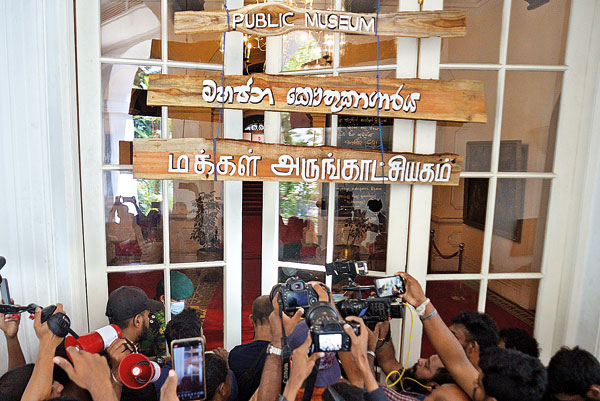Columns
A week of many firsts amidst hits and misses on social media
View(s): It has been a historic week for Sri Lanka in its post-colonial history. It was the first time a popularly elected President resigned after two and a half years in office. Secondly, the President fled abroad due to protests at home.
It has been a historic week for Sri Lanka in its post-colonial history. It was the first time a popularly elected President resigned after two and a half years in office. Secondly, the President fled abroad due to protests at home.
Unlike other heads of state, President Gotabaya Rajapaksa is the first one to resign from office through email correspondence to the Speaker of Parliament. This led to an additional process of verification and authenticity of the letter.
The resignation saga hit the front pages of international dailies as well, and the Saudi air flight from the Maldives to Singapore carrying President Gotabaya turned out to be
the world’s most-tracked flight on Thursday.
As much as global interest and focus turned towards Sri Lanka throughout the week, there was no shortage of fake news and unverified content on social media platforms for ‘hits’ and ‘likes’ speculating the whereabouts of the President and his future plans.
Unfortunately, in some instances, local media too picked up these stories that attributed ‘unnamed sources’ and ran them, only to realise later that they were fake once they were confirmed officially. By then it was too late.
On Thursday, a day after President Rajapaksa voluntarily declared to resign from office,
a dummy letter with the official emblem of the President’s Office, but without the President’s signature, was widely circulated. Some international news institutions too picked it up
as the genuine one and published it as the official resignation letter, followed by local media
as well.
The Presidential Secretariat was quick to refute said letter and confirmed that it was fake within hours. By that time it
had been shared and circulated among wider networks but the official denial did not secure as much traction compared to the fake letter.
CNN Philippines asks for evidence from ‘the robber’s mother’
The past few weeks have been hectic for international commentators, civil society activists and so called ‘Sri Lanka experts’ commenting on the Sri Lankan crisis in global news bulletins and programmes on what went wrong based on their own analysis.
The latest to join the bunch is none other than former Central Bank Governor Arjuna Mahendran, who is currently a fugitive due to his involvement in the Central Bank Treasury Bond scam that cost the state coffers billions of rupees.
CNN Philippines in its programme “The Final Word” invited former Governor Mahendran to share his thoughts on how Sri Lanka became a bankrupt nation while the focus was on how some 600 Filipinos living in Sri Lanka find it difficult to secure essential products including food due to the current situation.
The former Governor wanted by Sri Lankan authorities for prosecution took part in the programme from his residence in Singapore.
Concerned Sri Lankans took the matter directly to CNN management asking whether they were aware of his past role as Governor during the Treasury Bond scam, and on what basis he was invited to the programme.
One Lankan user left a comment on the programme: “The person who is responsible for the economic collapse is describing how it happened. We called it; “asking for evidence from the robber’s mother.”
Chief Opposition Whip not given a place in front row
Most party leaders were in Parliament on Friday to attend the special party leaders’ meeting convened by the Speaker. Before that got underway, however, different parties met at various locations in the complex to discuss the prevailing political crisis and take decisions on how best to move forward.
When the Opposition party leaders arrived, most leaders of parties representing the Government had already taken seats at committee room 2 where the party leaders’ meeting was due to begin.
Chief Opposition Whip Lakshman Kiriella arrived a little late and when he looked for a seat in the front row, he saw that none was available, leading him to try to move to the back.
He was stopped by Leader of the House Dinesh Gunawardena, who asked the senior politician to take a seat at the front. However, Mr Kiriella still tried to move to the back as he could not see a vacant seat at the front, leading Mr Gunawardena to say to all; “the Chief Opposition Whip must sit in the front row.”
“You are the only person here who knows manners. Most of the party leaders today are ignorant of what it means,” replied Mr. Kiriella.

Rohini Kosoglu
Rohini to quit as Kamala Harris’ close aide
United States’ Vice President Kamala Harris will lose one of her closest and longest-serving aides – Sri Lankan-American Rohini Kosoglu, according to the Washington Post.
She will be quitting her job as the Vice President’s domestic policy adviser in August.
Ms. Kosoglu, 38, whose parents were from Jaffna, previously served as chief of staff in Ms. Harris’s Senate office and on her unsuccessful presidential campaign.
In an interview, Ms. Kosoglu — who has three sons, ages 9, 6 and almost 3 — cited a desire to spend more time with her family. She has advised Ms. Harris on a range of issues, including maternal health, reproductive rights, broadband access and voting rights.
 Protestors want the President’s House to be a public museum
Protestors want the President’s House to be a public museum
On Thursday, a group of leaders associated with the “aragalaya” (struggle) held a press conference at the Galle Face protest site to announce they would vacate all buildings occupied by protesters–except the Presidential Secretariat.
In accordance with the decision, groups of protesters first cleaned and then handed over the President’s House, Temple Trees and the Prime Minister’s Office to government authorities.
Yet, there appeared to be no agreement on handing over buildings such as the President’s House for private use by future Presidents. As the last protesters left to chants of “Aragalayata Jaya Wewa” (Long Live the Struggle), they kept in place a sign at the building’s main entrance, reading “Public Museum” in English, Sinhala and Tamil.
“No, we do not want any more Presidents to come and live here. These buildings should no longer be closed off from the public. They should be public spaces,” said one of the last protesters to leave.
A Prof who met a member of the Rajapaksa clan takes a walk down memory lane
As the Rajapaksa family dynasty seems to come to an end now, many who maintained close ties with the family and benefited from them directly or indirectly are busy removing such material from the public domain and from social media to clear their names for the next innings.
Politicians and opportunists apart, scholars and academics too shared their experiences of interacting with Rajapaksa family members during their time in office–more than 17 years–and how they shaped the Sri Lankan narrative in the post-war period with militarisation and
divisive politics.
Among them was Brian Klass, Associate Professor in Global Politics at University College London, narrating his experience of interacting with a young Rajapaksa sibling with future Presidential aspirations.
The following was from a Twitter thread he had posted explaining his experience. This series of tweets went viral this week.
“As Sri Lanka’s president flees and the country’s economy is in tatters, let me share a story—in which I had breakfast with the former president’s son—because it shows how little, seemingly insignificant details can reveal so much about elites in highly corrupt countries.
“A few years ago, I got a message out of the blue, requesting a meeting. I agreed and booked a breakfast table at a posh cafe in London, near the LSE, where I worked. I had cereal at home, because I knew the cafe was expensive. Then, the president’s son arrived.
“We chatted. He asked me about democracy and authoritarianism (which intrigued me; why was he asking?). We each had one coffee and one croissant. After an hour, the bill arrived. It was for over £100 (about $140 at the time). I knew immediately that it was the wrong bill.
“But before I said anything, the President’s son opened his wallet, took out £120 in cash, and plonked it down on the table. I was astonished, but quickly explained it was a mistake, got the waiter’s attention, and got the right bill (it
was for around £15). We paid; he left.
“He had traveled widely previously—and had lived in the UK—so he knew the value of the pound. It was a window into how elites behave in a deeply corrupt country where the average person earns about $3,000 per year.
“I don’t study Sri Lanka, so that was the extent of my interaction with him, but I couldn’t help think of it this week as protesters stormed the most recent president’s palace (his uncle) and swam in their swimming pool. (FWIW, the son I met is now hoping to become president).”
Fuel becomes the new narcotic due to thriving black market
In the recent past, there were instances where narcotics drugs which were seized by Police went ‘missing’ due to unknown reasons while they were in Police custody. Then once the matter was raised in courts, investigations were launched to sack some officials.
Nowadays, the new material equivalent to narcotics is fuel.
In recent weeks, Police officers are actively carrying out raids to arrest those who are hoarding fuel in large stocks to curb the thriving black market for fuel.
A fisherman from Mannar lamented that the Navy seized 600 litres of petrol from his fishing hut two weeks ago on the charges of hoarding fuel even though he explained to officials that due to a shortage of kerosene,
he was running his boat on petrol.
His boat and the seized fuel were handed over to the Police for further legal action. Police submitted to court that 60 litres of petrol were in his possession. When the fisherman raised the issue with Navy personnel later, he was told the Police were given 115 litres of petrol, but nobody knew what happened to the rest of the petrol seized from him.
He wants to know what happened to the petrol seized from him, and is determined to raise the issue when the case comes up for a hearing next week.
Buying or selling electronics has never been easier with the help of Hitad.lk! We, at Hitad.lk, hear your needs and endeavour to provide you with the perfect listings of electronics; because we have listings for nearly anything! Search for your favourite electronic items for sale on Hitad.lk today!


Leave a Reply
Post Comment